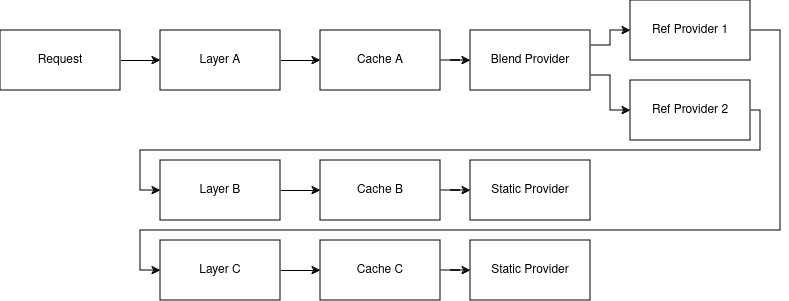Blend
Allows you to combine the imagery from multiple providers. The simplest use case for this is to "sandwich" or "composite" semi-transparent images on top of each other. For example you can put county boundaries on top of a flood map or include a watermark on your maps. Multiple blending modes are available to fine-tune the effect.
This can only be used with layers that return JPEG or PNG images. Tiles will be scaled down to the lowest resolution to be combined and the combined result always output in PNG format.
Each downstream provider is called in parallel.
The following diagram depicts a possible request flow when using the Blend provider with the layers parameter. Note that each downstream layer is individually cached; this is useful when it’s expected for requests to also come in for each of the individual layers but an unnecessary cost if not. If you only expect requests for the blended layer, either use the providers parameter option or simply disable caching in the downstream layer(s).

Name should be "blend"
| Parameter | Description | Type | Required | Default |
|---|---|---|---|---|
providers |
The providers to blend together. Order matters |
Provider[] |
Yes |
None |
mode |
How to blend the images. Examples of the modes. Possible values: "add", "color burn", "color dodge", "darken", "difference", "divide", "exclusion", "lighten", "linear burn", "linear light", "multiply", "normal", "opacity", "overlay", "screen", "soft light", "subtract" |
String |
No |
normal |
opacity |
Only applicable if mode is "opacity". A value between 0 and 1 controlling the amount of opacity |
Float |
No |
0 |
layer |
An alternative to the |
Object - See next rows |
No |
None |
layer.pattern |
A string with one or more placeholders present wrapped in curly brackets that match the layer placeholder you want to refer towards |
String |
Yes |
None |
layer.values |
An entry per instantiation of the layer, each entry should have a value for each placeholder in the pattern with the key being the placeholder and the value being the replacement value |
{"k":"v"}[] |
Yes |
None |
Example:
provider:
name: blend
mode: normal
layer:
pattern: noaa_poststorm_{date}{version}
values:
- date: 20230902
version: a
- date: 20230901
version: b
- date: 20230901
version: a
- date: 20230831
version: b
- date: 20230831
version: a